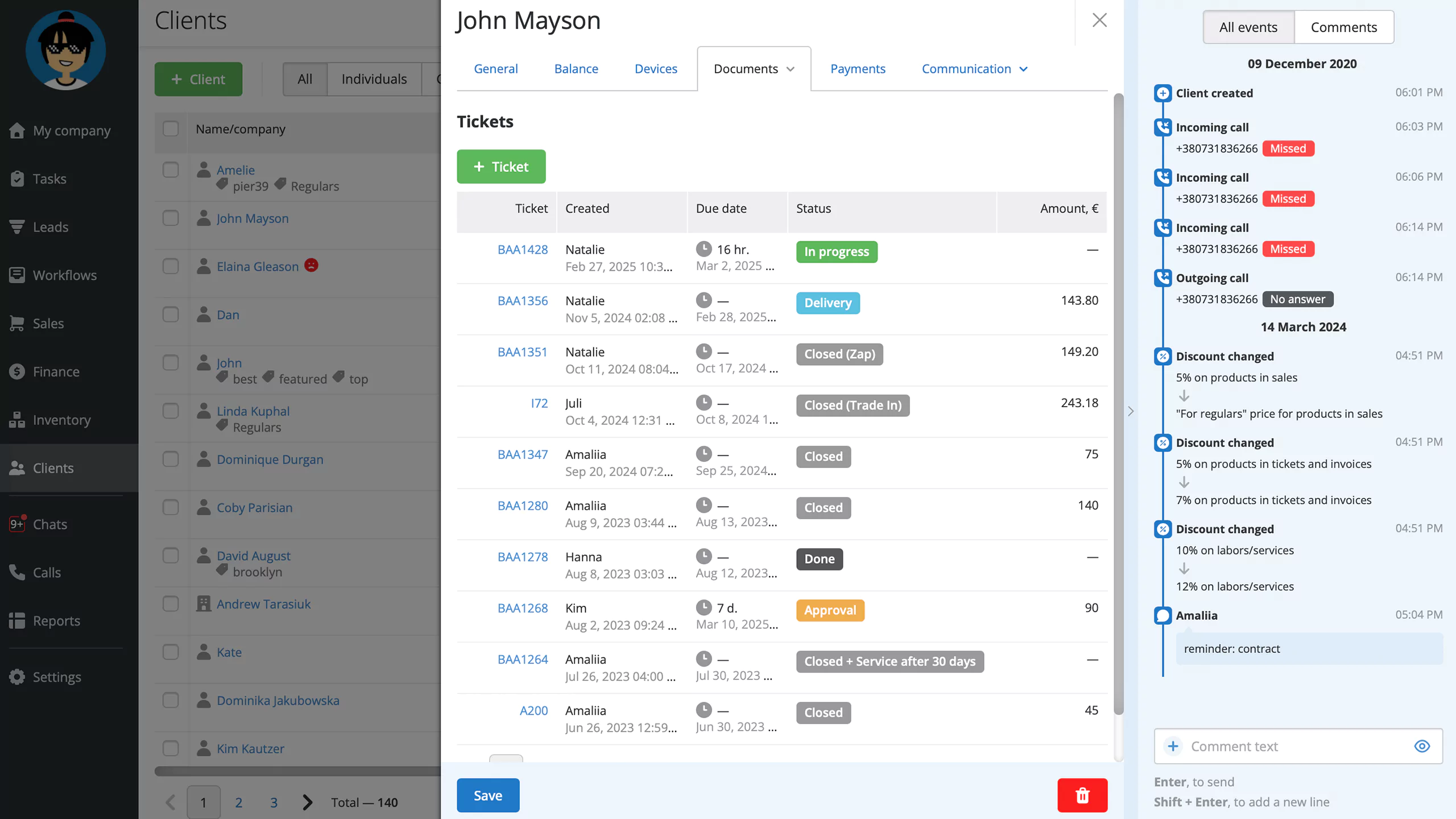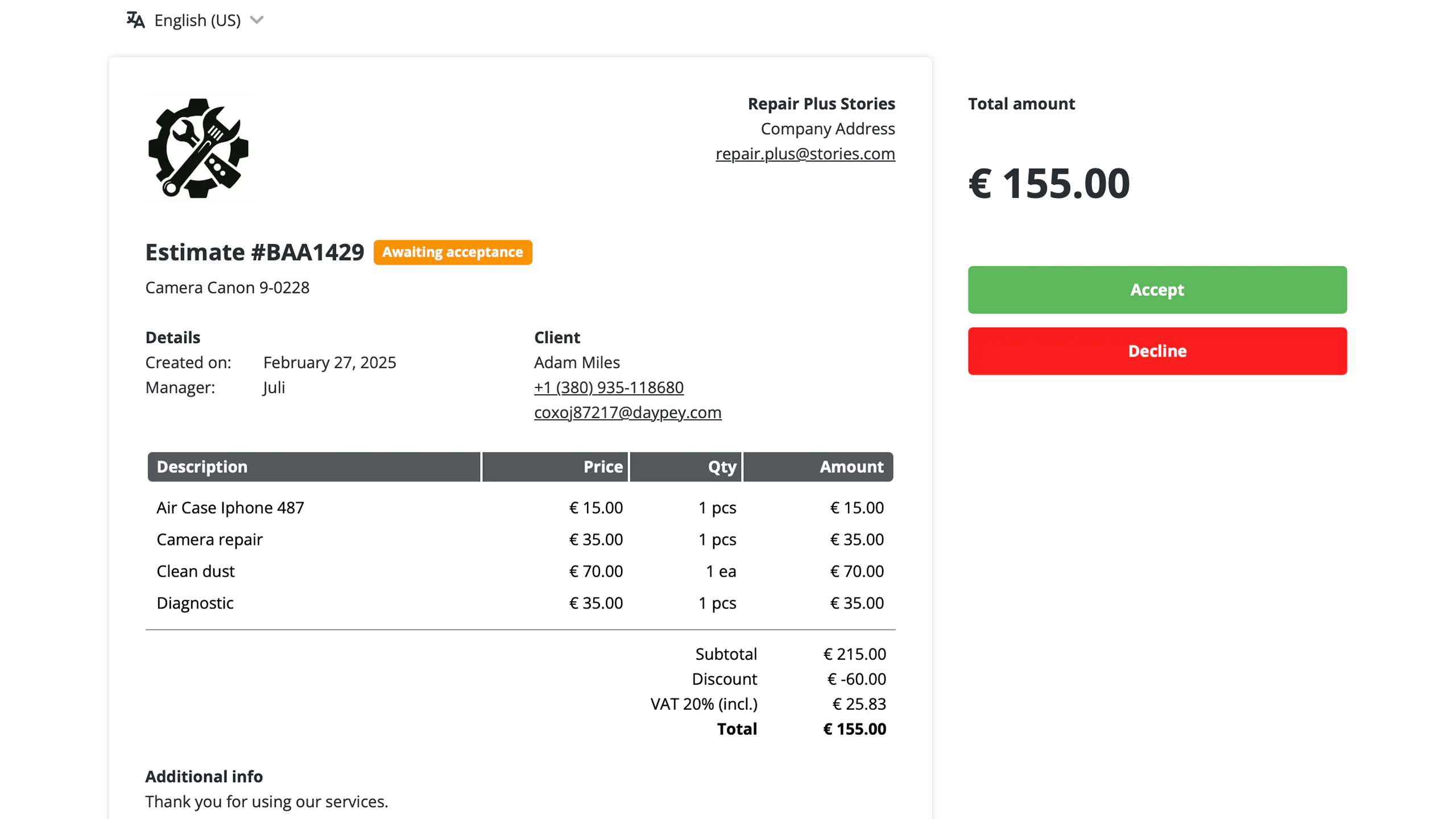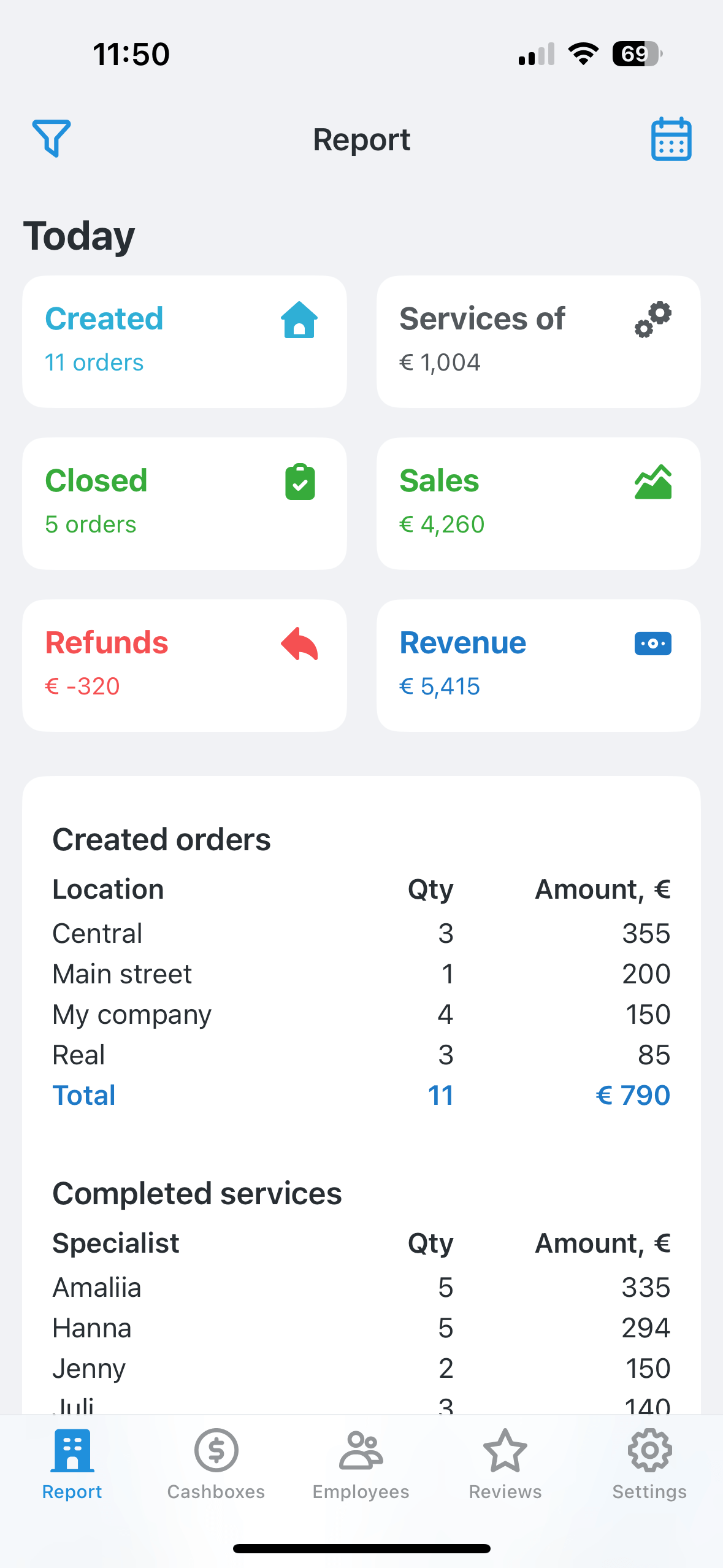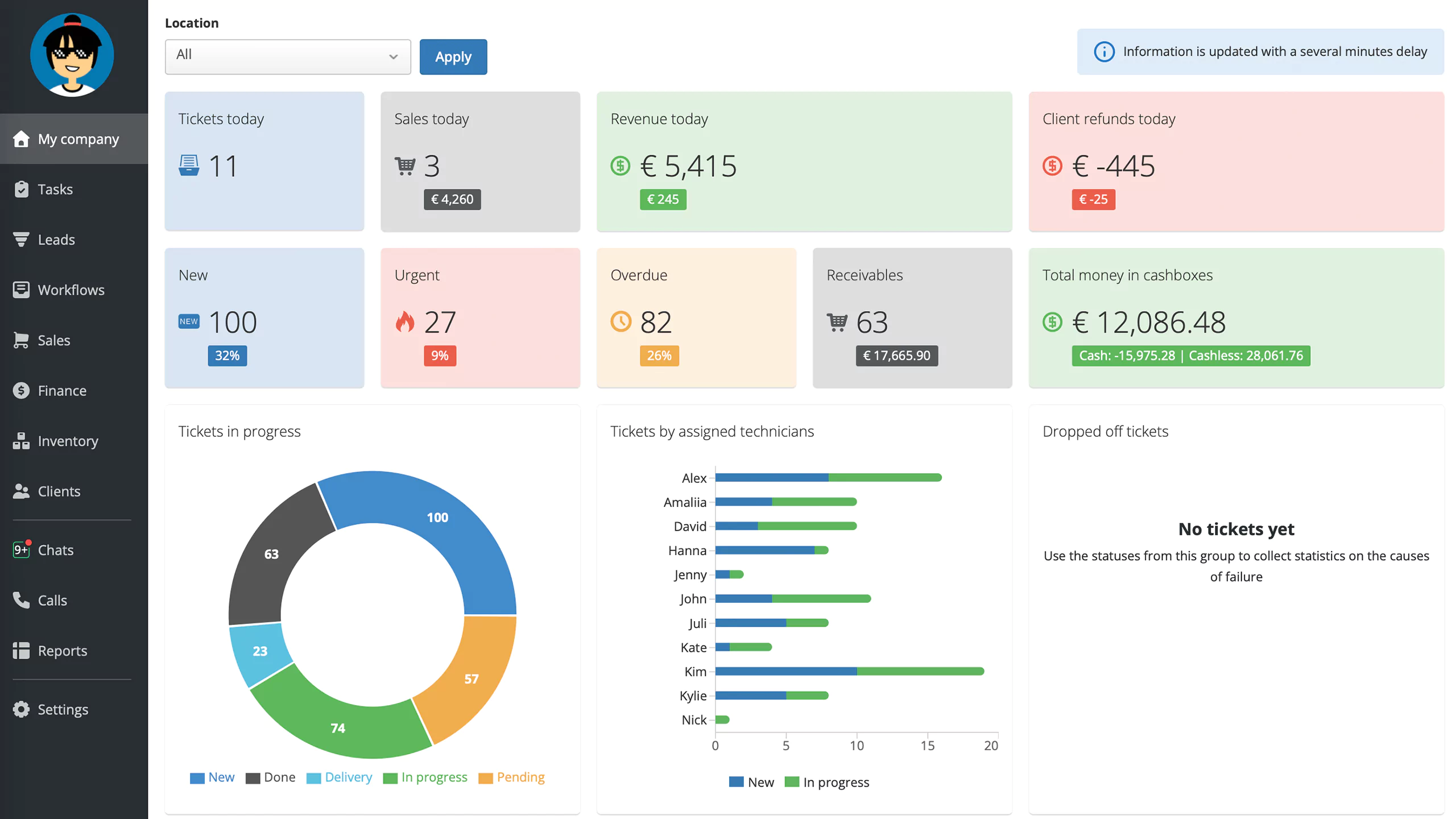What Is CRM (Customer Relationship Management)?
Find out what CRM is, its advantages, and why you should have incorporated this practice into your workflow a long time ago.
Table of Contents
What is The Definition of CRM?
Benefits CRMs Offer to Small Businesses
Types of CRM Solutions
How CRM Improves Small Businesses’ Everyday Lives
7 Steps to Get Started with CRM
Final Thoughts
Small businesses are under tremendous pressure to remain competitive in today's marketplace. One way to stay ahead is to go digital. This article will discuss many advantages of CRM solutions for customer service, sales, and marketing departments.
What is The Definition of CRM?
So, what exactly is CRM, and why should you care? At its core, CRM (customer relationship management) encompasses practices, strategies, and technologies designed to analyze and manage customer interactions throughout the customer lifecycle. But it goes beyond mere automation.
What is CRM for? Its main purpose is to enhance customer satisfaction and drive sales growth. Customer database software provides important insights into the customers you are doing business with and the customer retention level you have in your company. You also get data on how your target audience responds to specific business strategies to know what works for your company.
Whether you're a small business owner, a sales professional, or just curious about the inner workings of modern businesses, understanding CRM is essential. Let’s delve into the intricacies of CRM and uncover how it can revolutionize the way you think about customer engagement.
Benefits CRMs Offer to Small Businesses
Often, entrepreneurs and managers of small businesses feel overwhelmed and spread thin. There are many moving pieces and people they need to keep track of, and they often look for ways to optimize their time and efficiency. Do you recognize yourself? If yes, it’s time to change the way you work, incorporating business productivity tools into your daily processes. Just look at the benefits of using a CRM system:
- Improved customer relationships
Small business management software centralizes and organizes customer data, enabling businesses to easily track and manage interactions, preferences, and purchase histories, which in turn fosters personalized communication and improved customer service.
 Client tickets history
Client tickets history
- Streamlined communication
You can integrate multiple communication channels into a single platform. Inquiries from Facebook Messenger, WhatsApp, and Instagram are sent to the customer communication software automatically for further processing by your sales team. - Increased sales and revenue
Quoting software allows you to produce and deliver accurate quotes in a few clicks to speed up communication and payment. CRM solutions like RemOnline automatically send emails and reminders to prospects who haven't responded to the company's outreach and offers, shortening sales cycles and increasing sales productivity.
 Customer approvals via Public Forms
Customer approvals via Public Forms
- Enhanced data management and analysis
Analytical tools like the RemOnline Dashboard App allow you to ensure you're spending time on the clients who provide the most revenue and those who need the most attention.
 Daily report in RemOnline Dashboard App
Daily report in RemOnline Dashboard App
Impressive? And these are just a few. If you are ready for such a solution, let’s discover different types of CRM systems.
The client approval feature has been a game-changer for us. It allows our clients — many of whom are high-profile individuals who value control — to review and approve orders remotely, complete with their digital signature. Even with our concierge service where our seamstress visits them, this feature allows us to send the order for final review and approval, ensuring they’re involved in every step.
Types of CRM Solutions
You can find various types of CRM software on the market. Depending on your business needs, company size, and complexity of internal processes, you should consider one of the following options:
- Operational CRM focuses on automating and improving customer-facing processes such as sales, marketing, and service, by providing tools for managing contacts, leads, and customer interactions.
- Analytical CRM emphasizes data analysis to better understand customer behavior and preferences, helping businesses make informed decisions and personalized offers.
- Collaborative CRM enables seamless communication and collaboration between various departments within a company and with customers, to enhance the overall customer experience.
- Social CRM integrates social media channels into the CRM strategy, allowing businesses to engage with customers in real time and gather insights from social interactions.
 Engaging with customers through various social platforms in RemOnline
Engaging with customers through various social platforms in RemOnline
What Type of CRM is RemOnline?
RemOnline is a cloud-based CRM designed specifically for service businesses, particularly those in the repair and maintenance sectors. It offers a comprehensive set of tools to manage customer relationships, streamline operations, and track sales and service performance.
By combining customer management, job scheduling, estimating and invoicing, digital work order system, online task tracking, employee management, and reporting, RemOnline enables businesses to improve service efficiency and maintain strong communication with clients. Its user-friendly interface, seamless integrations, and accessibility from any device make it a valuable solution for businesses looking to enhance their customer service and operational workflow. There are other pleasant advantages:
- work order app for field teams
- free trials and onboarding assistance
- flexible subscription plans based on your company's size and industry
- pre-installed service lists, directories, and templates of documents and forms
What is the Best CRM for Small Businesses?
The best CRM for small businesses often falls into the category of cloud-based solutions, as they typically offer flexible pricing plans, lower upfront costs, and the ability to scale as the business grows. Many cloud-based CRMs provide free tiers or affordable subscriptions that include essential features, making them accessible for budget-conscious entrepreneurs. Popular options include HubSpot CRM, RemOnline software, Zoho CRM, RepairDesk, RepairShopr, and Shopmonkey, which all offer affordable pricing models that can accommodate various business sizes and needs. By choosing a CRM that aligns with their specific requirements and budget, small businesses can enhance their customer relationships without making a significant financial commitment.
How CRM Improves Small Businesses’ Everyday Lives
For SMBs, CRMs can be especially helpful regarding scalability and efficiency. They also often lack the manpower and resources to streamline operations in every business area. CRMs can help save money by boosting productivity and allowing you to use your time and resources better. Using it in sales, marketing, administration, and other departments will benefit you as an owner, your sales reps, your marketing team, and your customers.
How CRM Tools Help with Sales
A CRM's most visible and helpful role is in sales. Closing a sale can be lengthy and complicated, especially for a small local business. It can be challenging to keep tabs on all the information involved. For instance, RemOnline’s jewelry store CRM helps track and organize everything from inventory to repairs and customer management to increase sales of products and services.
How CRM Helps with Marketing
It simply collects all the data you need to know about your customers to understand their behavior and customer journey. This includes contact information, buying habits, demographics, and customers’ wants. By providing visibility into customer interactions and intent, the tool will help you customize your marketing messages, offerings, and services to meet your target audience's needs, retain more customers, build long-lasting customer relationships, and develop a marketing strategy that truly works for your business.
How CRM Increases Workplace Productivity
CRMs keep employees organized and on task, enabling them to focus on customer satisfaction. It also makes it easier to track interactions with customers, such as the status of a work order, their complaints, and requests, so your customer service representatives can better communicate with clients and make them feel valued.
As a tool that demands accuracy, consistency, and discipline, a CRM is designed to offer clients reliable, comprehensive customer service. With automated features, it schedules appointments, alerts people of upcoming deadlines, sends reminders, resolves issues, tracks payments, and more.
Our initial solution worked well for what we needed to do: keeping things off paper and into a computer. However, you must know a fair amount about programming to set it up how you want. I'm a business owner, not a programmer, so I started the search for a SAAS solution and found RemOnline.

Chris Eudy
Owner
Third Coast Guitar Service
How CRM Improves Financial Management
With a handy digital solution, you can monitor amounts from clients received with each work order and sale, control payment settlements with customers and suppliers, and handle product returns and warranty claims. If you integrate invoicing software with an accounting program like QuickBooks or Xero, your data will be automatically synchronized between the systems, saving you much time and effort in keeping track of your finances.
How CRM Boosts Repeat Business
As each client has an individual profile in the system, you can set up discounts, track the history of provided services and sold goods, view associated assets, and read feedback and reviews. This information helps you understand your customers and generate ideas for promotion campaigns, special offers, and loyalty programs.
How CRM Speeds Up Data Management
Keeping your database clean and organized requires much manual work and attention when you do everything old-fashioned. In a CRM solution, you can merge duplicates, update client information, autofill fields in forms, and customize and automate messages — all in a few clicks.
How CRM Helps with Analytics
Company dashboard software provides a centralized platform to collect, track, and analyze customer interactions and data. You can gain valuable insights into customer preferences and behaviors to make informed decisions that drive sales and improve customer satisfaction. By leveraging CRM analytics, small businesses can identify trends, measure the effectiveness of marketing campaigns, segment their audience, and tailor their offerings to meet specific needs.
 Business Dashboard in RemOnline
Business Dashboard in RemOnline
7 Steps to Get Started with CRM
The most convenient way to see all the benefits of a CRM solution for your business is by evaluating its functions during a free trial. You don’t have to commit right away, just schedule a demo to see the solution in action in your everyday context. In addition, it is also possible to involve your employees in the evaluation process to get their feedback.
Let’s see what steps you need to do to start managing your business processes in RemOnline:
- Sign up for a 7-day free trial or book a demo first to see how RemOnline can help you achieve your business objectives.
- Select your niche during signing up to simplify the further configuration of your account. When your registration is completed, you will get industry-specific directories, service lists, and document templates already uploaded to your account.
- Specify your company information and upload a brand logo. RemOnline will use this data to autofill your document templates.
- Import your customer database if you already have one.
- Invite your employees to join RemOnline and set up their profiles. Next, ask them to install the RemOnline App after registering in the web version.
- Complete work order/ticket/job settings: statuses, forms, document templates, and notifications.
- Create your first work order/ticket/job, update statuses until completion, and close it when everything is done.
RemOnline is an intuitive tool that you can use without any technical knowledge. To learn its full functionality, turn on the program's training mode. Step-by-step instructions are also available in the Help Center and on YouTube. Alternatively, you can request onboarding assistance from RemOnline specialists to quickly get your account up and running.
Final Thoughts
A CRM for small businesses allows the owners to save time and money by running smoothly and efficiently. There are many reasons for this, such as the CRM could be used to create workflows, track deadlines, and job listings, and measure statistics such as the number of customers, leads contacted, and sales amount. This data can be tracked and monitored to see how the business is doing and what areas need improvement. The small business can then determine how it can reach its goals and make changes to improve efficiency. When choosing a solution for your business, look for an all-in-one SaaS platform because it covers the most needs of small companies: customer management, work order processing, appointment scheduling, financial accounting, payroll, inventory, and analytics.




